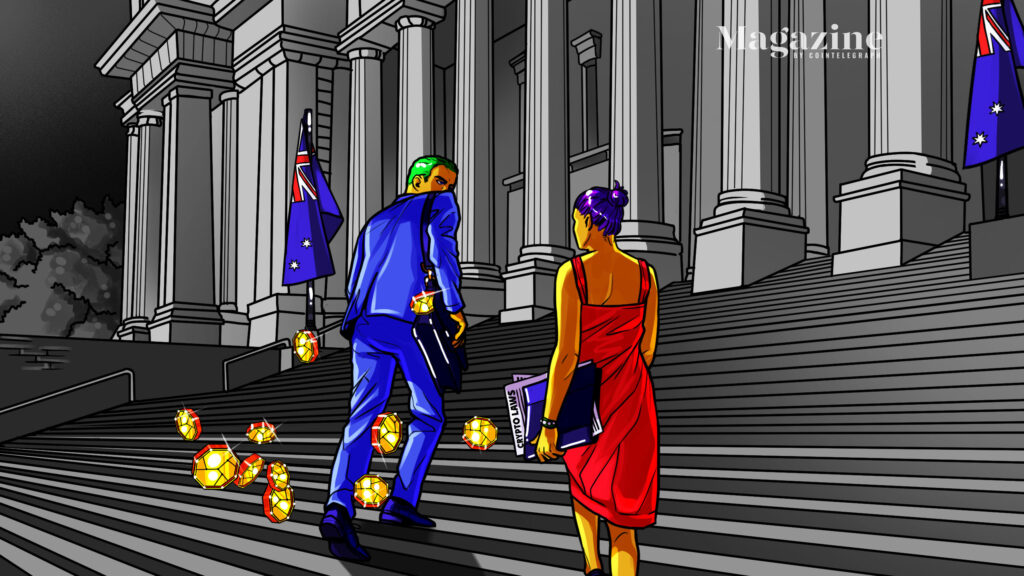The inside story – Cointelegraph Magazine

As crypto winter sets in once more, industry players in Australia, one of the world’s most crypto-friendly nations, watch closely for a shift in the regulatory climate.
Anthony Albanese, the new Australian Labor Party prime minister, has made regulating crypto a top priority. However, neither he nor his cabinet has given a clear indication of how it may approach the unregulated space.
“Labor campaigned for government without a policy for cryptocurrency,” says Senator Andrew Bragg, a member of the Liberal Party, which was recently cast into opposition after nine years in government.
The 37-year-old spearheaded a Senate report on crypto regulation last year that made 12 key recommendations on issues ranging from exchange registration to taxation and debanking. Speaking at the Australia Blockchain Week conference in March, he proposed the Digital Services Act, a legislative package that consolidated the report’s recommendations into law.

However, Bragg’s Liberal Party lost its parliamentary majority to the Labor Party in a federal election in May, and the act’s future remains uncertain.
“There have been no utterances about what Labor’s policies will be. It could be anything at this stage,” he added.
The Treasury declined to comment on its crypto policy plans for the report. So far, the office has only clarified that it will continue to exclude crypto from being taxed as a foreign currency, following El Salvador’s adoption of Bitcoin as legal tender.
Industry folk can only guess what the new government might do next, but Ron Tucker, founder and chair-emeritus of lobby group Blockchain Australia, sees a “silver lining” to this pregnant pause. He warns against the kind of knee-jerk responses to market volatility seen in other countries.
“Though we need to protect consumers, if we rush regulation, we will likely get the settings wrong, which will stifle innovation in the ecosystem and lock Australia out of the future growth of the global crypto market,” Tucker says.
“In truth, the proposals made in the Bragg report are only about 70% of the way. They could do with more work, and recent events such as the collapse of TerraUSD and Celsius have shown where the gaps are. We are now at a critical juncture, and so this is a chance to ensure we don’t head down the wrong path.”
Pioneer of self-regulation
While the focus has been on knee-jerk bans and crackdowns elsewhere, Australia has been quietly trailblazing a progressive approach to crypto.
“There is an unsung story of Australia as a first-mover in this space,” says Tucker, who founded Bit Trade — one of the country’s first successful cryptocurrency exchanges — in 2013 and shortly after led the Digital Currency Code of Conduct initiative that set the best-practice standards for the self-regulatory model that has undergirded the Australian crypto industry since.

Tucker recalls watching the pennies drop as he walked politicians in Canberra through the Bitcoin white paper back in 2014.
“The government was very responsive and endorsed our proposals for a self-regulated code of conduct, which was the first of its kind in the world,” he says.
“There were not many other industry bodies in other countries at the time, but more soon followed.”
The proposed self-regulating model was exported after Tucker’s group joined with counterparts in Singapore and the United States by setting up an informal alliance, the Global Blockchain Forum, in 2016. It then grew to have a dozen other member countries that coordinated through a multilateral memorandum of understanding based on the preexisting Australian code of conduct.
While this light-touch approach has given Australian projects space to grow over the years, the government will need to devote greater resources to formalize and enforce a regulatory model as mounting issues exert pressure on the ecosystem.
“You need to get the balance right and have a principled approach that remains flexible enough to encourage innovation in the industry,” says Caroline Malcolm, head of international public policy and research at Chainalysis — an industry consulting firm and blockchain analysis company that recently set up shop in Canberra.

Fraudulent advertising
Crypto ads are in the crosshairs of Australian regulators. The country’s top consumer watchdog, the Australian Competition and Consumer Commission, or ACCC, recently took Meta to court, alleging the company is legally responsible for losses incurred by users who engaged with scam crypto ads featuring fake celebrity endorsements that have run on Facebook since 2019. This has renewed the conversation around consumer protection for crypto investors in policy circles.
Malcolm predicts Australia will likely follow in the United Kingdom’s footsteps when it comes to advertising.
“Australia has historically had a regime for financial products similar to the U.K., so it is probable it would adopt the same standards for the advertising of crypto,” she says.
“These include stipulating that companies clearly include a risk disclosure that is put alongside the advertised benefits of the product. It would also see crypto companies come under the advertising regulatory regime and ensure they are responsible for the content of their ads, regardless of the legal structure of their business.”
Mapping things out
Tucker believes that “token mapping” must be the new government’s top priority.
“This is the most important aspect, as it gives an overview of what’s happening and provides a blueprint for the government to respond to new developments in this rapidly changing industry,” he says.
A token mapping exercise was the third recommendation of the Bragg report, suggesting the government draft legal definitions of the different types of digital currencies by their functions. In March, Australia’s Treasury published a consultation paper on a proposed regulatory framework that featured a list of working definitions for tokens.
“This paper contained a detailed token mapping that went much further than typical distinctions, like what security and payment tokens are,” says Malcolm.
The report details at least 12 working category definitions for tokens in a “non-exhaustive list.” The government aims to complete the mapping exercise by the end of the year.
“This shows a commitment by the government to get across what is going on, and this will be essential for future-proofing regulation here,” Malcolm says. “Keeping the recent momentum from this public consultation will be crucial,” she adds.
The Treasury’s paper also proposes rules for “secondary service providers who operate as brokers, dealers, or operate a market for crypto assets.” Its stated rationale is to minimize the risk consumers face when service providers become insolvent and they cannot withdraw their funds. Critically, however, it specifies that these rules would not apply to “decentralized platforms or protocols,” leaving DeFi alone.
“This is a sign that Australia could end up with a very interesting model for the fast-moving DeFi space,” says Malcolm.
“Excluding DeFi itself is not a ‘rogue’ approach, however,” she says. “The EU is excluding DeFi from its Markets in Crypto-Assets regulation, which is due to be finalized shortly.” (Following our interview, the MiCA regulations were agreed on.) “But the EU has also said they will be looking to write rules for DeFi in the ‘near future.’”
If Australia were to do the same, how would it determine which entities are adequately decentralized?
Malcolm calls this the “eternal question” that hangs over regulators.
“There is certainly a view from some policymakers that what is called ‘DeFi’ is not always decentralized,” she says. “How decentralized are those platforms really?”
“If it’s sufficiently centralized, it should fall within the existing rules,” she says. “It is very hard to draw that line, but resolving this is key to determining where the rules apply.”

Disrupting debanking
Another persistent risk for crypto businesses is debanking — when a bank cuts off services to businesses or people it determines to be risky.
The Australian government has identified debanking as a growing problem and recognizes that digital currency exchanges and fintech firms are disproportionately affected.
“Debanking has been rampant in Australia since the early years of crypto,” Tucker says. “Our exchange has experienced debanking on at least 30 occasions.”
“We brought it to the ACCC’s attention at the time, and they would have liked to have responded, but they were too understaffed to do anything about it,” he adds.
“Businesses should have a fundamental right to banking, just like individuals, but it’s not just about writing the laws. We need to make sure agencies like the ACCC have the human resources to manage and the teeth to pursue anti-competitive behavior,” says Tucker.
Although the Labor government has not announced a clear agenda for crypto, reinvesting and restaffing the public service is a policy priority for the Albanese administration. Under the previous government, outsourcing public jobs doubled between 2015 and 2020. The new government has already pledged 500 million Australian dollars for the first phase of rebuilding public sector capacity.
Malcolm agrees that finding qualified officials not just to write the rules but administer the legislation is critical, but it will be an uphill battle.
“Capacity of expertise is very tight,” she says. “There is not enough expertise among the bureaucracy at the moment, and it takes time to find the right people. It’s one thing to write the rules but quite another to have the resources to administer them,” she adds.
“There’s this strong perception that crypto doesn’t want to be regulated. But what we’ve seen when countries put licensing rules in place is that the exact opposite happens. Suddenly, there’s this rush to register because companies see it as a net positive. Many governments are struggling to keep up with this demand for licensing, as most recently seen in the United Kingdom.”
The same could happen in Australia when rules are standardized and the registration wave hits.
“We really need a committee of technologists that acts as a bridging body between industry and government,” Tucker says. “A group established in partnership with Australia’s Commonwealth Scientific and Industrial Research Organization would likely be the best avenue for this,” he adds.
Collaboration over competition
The unprecedented nature of blockchain technology poses unique challenges for policymakers, which incentivizes governments to work together to identify regulatory best practices. Yet, with enormous potential economic value at stake, states are also vying to attract as much of the burgeoning investment it brings as possible.
Foreign investment in Australia has grown at around 8% per year for the past two decades, now standing at over 200% of total GDP. With finance remaining the third-largest sector for inbound investment, regulators are looking to harness crypto, blockchain and DeFi to spur growth further.
“The fact is, we are in a race against the U.S., Japan, Singapore and other advanced economies,” says Bragg. “It’s a race to build the most effective regulatory environment for cryptocurrency, and it plays out across investment, talent and consumer protection.”

“The Labor government has inherited world-leading policies from the Liberal Party when it comes to cryptocurrency. I believe this parliament can deliver on the bulk of the recommendations made in the Senate report.”
Tucker says that while Australia is well positioned, with a strong financial services sector, it should prioritize collaboration with other economies over competition.
“There is a far greater upside to international collaboration at this early stage,” he says.
“We should be learning from each other and closing loopholes together. A patchwork of contradictory laws across jurisdictions will weigh down the development of crypto globally.”
Sound regulation has underpinned the robust development of Australia’s traditional finance sector. Its banking sector has historically been among the most profitable globally, while its compulsory national retirement scheme, called “superannuation,” was ranked the fifth-best pension scheme in the world last year.
“Cryptocurrency is possibly the greatest economic opportunity this country has had since the advent of superannuation,” says Tucker. “But we must get the policy settings just right.”












